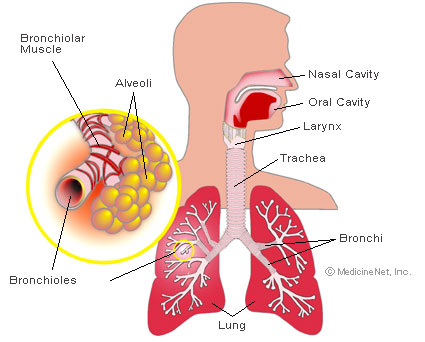
Chesty cough and weight loss,coughing up blood
Lung cancer can cause persistent cough and hemoptysis (coughing of blood) if the tumor involves a bronchus.
If the tumor involves the surface of the lung or invades the ribs, it can cause persistent pain. Sometimes this pain will be sharp and accentuated by deep breaths or coughing. this type of pain is called "pleurisy".
If a major air passage is narrowed by tumor, shortness of breath and pneumonia may occur.
If the tumor metastasizes to the brain, it can cause headaches or disturbances of vision, speech, balance, muscle power or sensation.
Bone metastasis presents as persistent localized pain in bones.
None of these symptoms is specific for lung cancer, and all can be caused by benign diseases including pneumonia, but when they occur in a patient who is a cigarette smoker, they should be promptly evaluated by a physician.
Lung cancer often has cough as it's first symptom.
The problem is that almost all smokers have chronic cough. Chronic cough in smokers is usually due to chronic bronchitis, an inflammation of the lining of the airways produced by inhaling smoke.
Smokers with chronic bronchitis also produce sputum, so-called "productive cough". Chronic bronchitis can be accompanied by destruction of lung tissue by emphysema or chronic obstructive lung disease, sometime also called "COPD". These problems also can cause cough as well as shortness of breath with activity. Chronic bronchitis can also lead to the coughing up of blood, called "hemoptysis" by doctors. Because almost all smokers cough, it is not possible to use the presence of cough as an accurate early warning sign for lung cancer. Coughing up blood is a more ominous sign and should be considered a serious warning that a lung cancer might be present.
My advice is that any smoker who has a chronic cough or coughs up blood should do a few important things. first, the smoker should call his/her doctor for an appointment. During the visit, they should ask for help with smoking cessation. (If you have already stopped smoking, that is great, but there is still a risk of lung cancer, and so the doctor visit is not optional.)
They should also ask for a pulmonary function test to see if there has been any damage to the lung's function. There is some information that shows that the risk of lung cancer is higher in smokers who have reduced pulmonary function tests.
They should also ask for a radiographic study of the lungs. In the past, chest x-ray was the standard, but now CT scan has been proven to be a much more sensitive test for lung cancer detection.
(m)
Symptoms and Warning Signs
Unfortunately, the symptoms of lung cancer can take many years to develop which often leads to diagnosis at an advanced stage of this disease. Some of the symptoms that may occur include:
Smoker's cough that persists or becomes intense.
Persistent chest, shoulder, or back pain unrelated to pain from coughing.
Increase in volume of sputum.
Wheezing.
Nonsmoker's cough that persists for more than 2 weeks.
Change in color of sputum.
Blood in sputum.
Repeated episodes of pneumonia or bronchitis.
Other symptoms that can be related to late-stage lung cancer can include:
Fatigue.
Loss of appetite.
Headache, bone pain, aching joints.
Bone fractures not related to accidental injury.
Neurologic symptoms, such as unsteady gait and/or episodic memory loss.
Neck and facial swelling.
Unexplained weight loss.
Other signs and symptoms may be caused by the spread of lung cancer to other parts of the body, including headaches, weakness, pain, bone fractures, bleeding, or blood clots.
there may not be any symptoms!
if there are symptoms they can include:
coughing, wheezing, shortness of breath, coughing up blood, pneumonia.
bone pain, fatigue, weight loss, fever, anemia, clubbing of the nails.
chest pain, shoulder pain, arm pain, difficulty swallowing, swelling of the face and or neck, hoarseness.
DO NOT try to self diagnose! if you think there is a possibility that you or someone you know has these symptoms see a medical professional immediately so that you will know what is really happening. DO NOT wait to seek help, time IS NOT your friend when dealing with cancer!!!